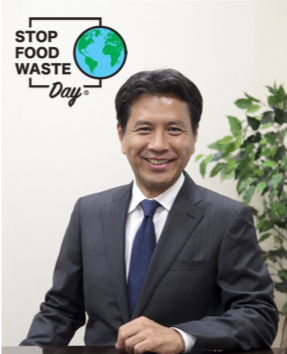A Conversation with Norihiro Ozawa, President and CEO - Compass Group Japan
What motivated your personal interest in sustainability and food waste reduction?
Compass Japan has been awarded ISO 14001 certification for 17 years renewing every year. Starting from headquarters and branch offices, now 66% of our sites have been certified by taking actions to reduce food wastes. This figure is the biggest in the field of food contract business in Japan. However, since our service itself heavily affects clients' activities to achieve their environmental goal, it is necessary to continue making efforts to realize further expansion and deepening of food waste reduction activities. As a leading company, the continuation of such activities will make the quality of our market itself higher, our clients and consumers happier, and finally the confidence of colleagues in Compass Japan higher.
Can you share a story about a food waste hero who inspired you?
Since long ago in Japan, people have cherished the concept of "MOTTAINAI," which expresses how people should respect the resources around us, to not waste resources, and to use them with a sense of gratitude. Finally it has been globally known through activities by Wangari Muta Maathai who was awarded Nobel Peace Prize in 2004.

In my childhood, I learned its concept from my grandmother who had experienced child-raising challenges during the period of food shortage after World War 2. With gratitude to blessings of nature, I had been educated to finish all foods on my plate. Naturally, I hand down the concept of MOTTAINAI to my children. I believe daily customs related to foods are highly influenced by the education from parents to children.
What change have you made, personally, to be more mindful of food waste?
When I go shopping with my wife to the grocery store, I always stop by an area of bargain products, to buy vegetables and fruits with less freshness, and seasonings which are close to expiration. While of course I can enjoy lower prices (buying bargain products), it is also important to teach my children these practices.
What will it take for Japan to make food waste a priority?
In Japan, the Ministry of the Environment takes initiatives to promote a variety of activities to reduce food waste. One of its core activities is to educate people about the food waste problem and how to solve it by changing eating habits at home and at the restaurant. Regarding education at home, they implement educational actions through school lunch for children. In restaurants, they promote the concept of "3010 movement" -enjoy foods for the first 30 minutes after the party starts and for the last 10 minutes before closing. They also promote a variety of actions to finish foods. In this sense, “Education” is a very important aspect among our actions for the Stop Food Waste Day in April.
What is one small change every person can make in their daily lives to make a big difference?
It is very important to organize ingredients in the refrigerator frequently. This will help prevent purchase of unnecessary foods, and utilizing foods close to expiration. Checking what is in the refrigerator is important before going shopping.





